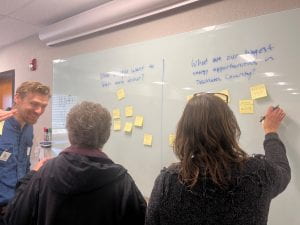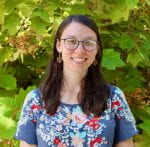by Grace Andrews, Energy Program Coordinator, The Environmental Center
When I came back for my second year of RARE, I knew I had a new supervisor for the next few months. I had one major goal for those months: to plan, organize, and host a public forum on local energy planning. It would educate the public on both the work I had done in the past year and what I was planning to do, as well as featuring speakers from the local community who would talk about exciting energy projects and opportunities in their fields. There would also be the opportunity for attendees to discuss their views on local energy opportunities and priorities, and to listen and learn from each other as well as the speakers. It was a fitting project to start off the year. The only issue was that I had never done anything remotely like this before. Luckily I had help from my wonderful supervisor, who, while she didn’t know much about my projects from last year, is an experienced event planner.
There was a lot to do, starting with the venue. I toured multiple venues that were nice but didn’t match what I imagined for theevent – unavailable for the event date, or too dark, or too fancy, or too expensive. But finally, we found a large classroom-style space at our local OSU extension that was perfect. The other challenge was speakers. In September, I already had a short list of people I wanted to speak at my event, and I reached out to them about the date I’d chosen. When they didn’t reply, I followed up. Far too close to the event date, I ended up contacting a much longer list of potential speakers and learning that this is what I should have done from the beginning. Armed with a small number of speakers I could count on to attend the event, I turned to the issue of getting people in the room to listen to those speakers.
With some confirmed speakers, a venue, and a date, we could begin promoting the event more fully. The vague flyers I had made with a “save the date” message for the event and the link to an unfinished event page on our website were replaced with a better-looking, more informative version. I sent out targeted email invitations to people who had attended other meetings I had held last year. I posted the event on all the local event calendars, and we sent out the info in our newsletter. When it was time to put in the catering order for lunch, we still had no idea how many people would actually be there.

I found that the most valuable tool at my disposal was to show up at other events and talk to the people there. After all, those were the kind of people to attend events. Maybe they’d also feel like learning about the local energy landscape for a day? And to my surprise, they did. At least two people that were volunteering at the Environmental Center booth for another event showed up at my event the next weekend. Personal connections I made at earlier events were proven important as well. At the energy forum, I recognized most of the faces. Still, there were also people I’d never met before, and it was so rewarding to meet community members that showed up out of pure interest for participating in a conversation about energy.
Although it was a small group, about 15 people plus five or six speakers, the event was more than successful. The small group allowed for deeper conversations, and more detailed discussions, including while the speakers were presenting. I had expected to be ahead of schedule because I gave each presenter a pretty large chunk of time, but instead we were behind schedule almost immediately because the attendees were asking so many questions. There may not have been a big crowd, but the people who had chosen to sacrifice a sunny November Saturday to talk about clean energy in their community were curious, excited, and engaged.
After the event was over, I didn’t want to lose momentum, so I continued with my plan to put together a working group to continue work on a future local energy plan. We already had plenty of sign ups for the group from the energy forum attendees, but I also invited everyone I knew locally in the energy world from the past year I have been working with the Environmental Center. We had our first meeting last week, and it was so rewarding to see everyone there, ready to get to work and make a difference for local energy. After over a year of working on energy planning projects mostly alone, and planning an event by myself for the first time, I’m so excited to build up a team that will help bring these projects to the next level.
 About the author, Grace Andrews: Grace graduated from Colby College in spring 2021 with a B.A. in Environmental Science and is now in her second year of service as a RARE AmeriCorps member. She is passionate about fostering connection with the environment and getting communities involved in environmental efforts. In her second year as Energy Program Coordinator for The Environmental Center, Grace is focusing on the goal of beginning the development of a community energy plan for Deschutes County. A variety of projects will help to accomplish this goal, including completing a baseline energy assessment for the county, coordinating a team of volunteers to help shape a local energy plan, and deepening community engagement through events and outreach. She was born and raised in a small town in Maine but enjoys exploring everything Oregon has to offer, especially if it involves skiing and hiking!
About the author, Grace Andrews: Grace graduated from Colby College in spring 2021 with a B.A. in Environmental Science and is now in her second year of service as a RARE AmeriCorps member. She is passionate about fostering connection with the environment and getting communities involved in environmental efforts. In her second year as Energy Program Coordinator for The Environmental Center, Grace is focusing on the goal of beginning the development of a community energy plan for Deschutes County. A variety of projects will help to accomplish this goal, including completing a baseline energy assessment for the county, coordinating a team of volunteers to help shape a local energy plan, and deepening community engagement through events and outreach. She was born and raised in a small town in Maine but enjoys exploring everything Oregon has to offer, especially if it involves skiing and hiking!
Interested in gaining environmental and sustainability planning experience of your own? Are you looking for a life changing experience in rural Oregon? Learn more about serving with the RARE AmeriCorps Program. Applications for Year 30 (2023-24) due April 30, 2023 by 11:59pm PDT.
